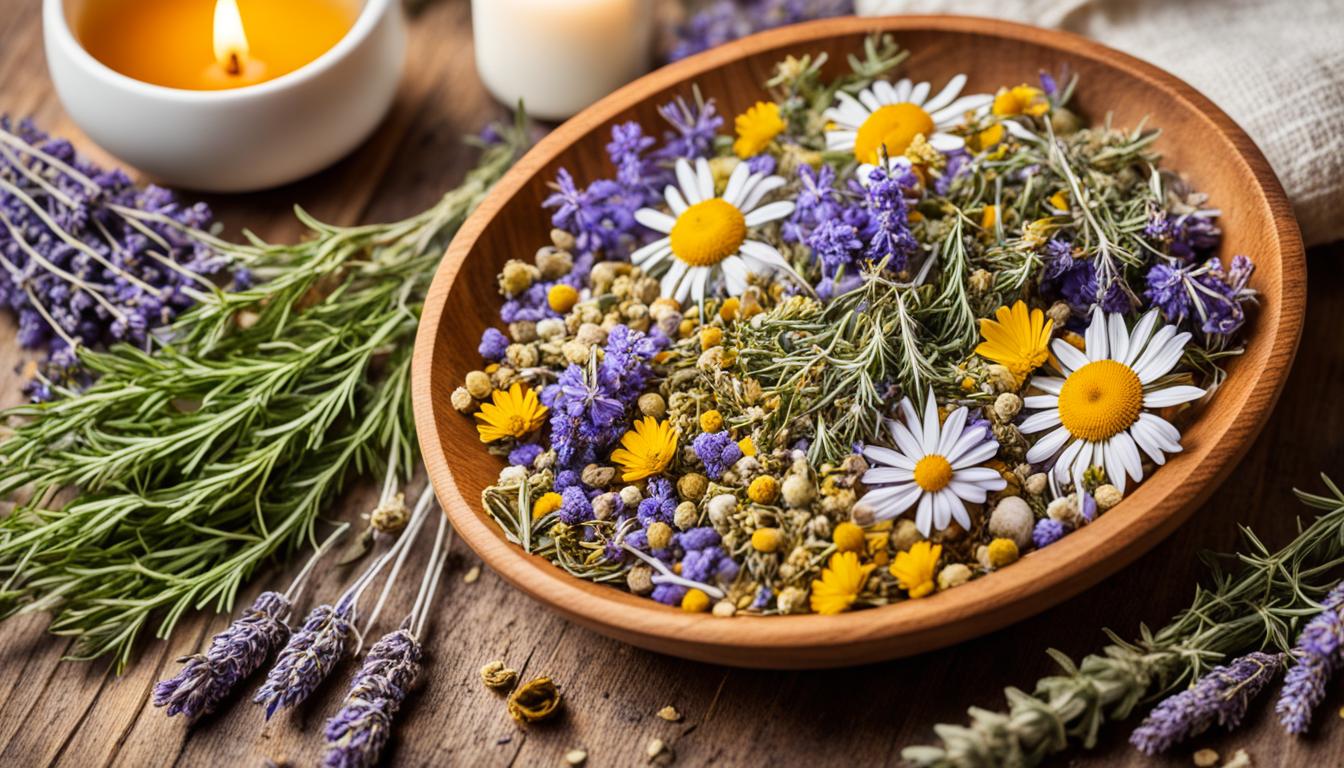Are you tired of tossing and turning at night, struggling to get a good night’s sleep? If so, you’re not alone. More than 60 million Americans suffer from poor sleep quality, which can have a detrimental impact on both their emotional and physical well-being. But what if there was a natural solution to help you sleep peacefully?
Introducing herbal remedies for sleep, a safe and effective way to improve your sleep without relying on prescription sleep aids. With the power of nature’s sleep aids, you can awaken refreshed and rejuvenated, ready to take on the day ahead.
So, what exactly are these herbal remedies that can work wonders for your sleep? From warm milk to chamomile tea, tart cherry juice to melatonin supplements, there are a variety of options to choose from. But how do they work? And which herb is the best fit for your sleep struggles?
In this article, we will explore the science behind herbal remedies for sleep and delve into the effectiveness of each natural sleep aid. Get ready to uncover the secrets of herbal remedies that have been used for centuries to promote restful slumber. Say goodbye to sleepless nights and hello to a blissful night’s sleep!
The Power of Melatonin
Melatonin, a naturally occurring hormone in the body, plays a crucial role in regulating sleep and wakefulness. It is triggered by reduced exposure to light, signaling to the brain that it’s time to sleep.
Melatonin supplements can be a useful tool for individuals struggling with disrupted sleep patterns, such as those experiencing jet lag or working night shifts. These herbal sleep supplements can help promote a restful night’s sleep and combat insomnia.
Research has shown that melatonin supplements can significantly reduce the time it takes to fall asleep and increase total sleep time. By mimicking the hormone naturally released in the brain, melatonin supplements can regulate sleep-wake cycles, helping individuals establish a healthy sleep routine.
It is important to note that melatonin supplements are generally safe for short-term use. However, individuals who are pregnant or nursing should consult a healthcare professional before considering the use of melatonin supplements.

Benefits of Melatonin Supplements for Sleep:
- Reduces the time it takes to fall asleep
- Increases total sleep time
- Regulates sleep-wake cycles
- Promotes a restful and rejuvenating sleep
“Melatonin supplements have been a game-changer for me. As someone who frequently travels for work, jet lag used to disrupt my sleep patterns. Since incorporating melatonin supplements into my routine, I’ve been able to achieve better quality sleep, no matter the time zone.” – Sarah Thompson, frequent traveler
Valerian Root: Nature’s Sedative
Valerian root is an herbal remedy that has been used for centuries to promote better sleep. Numerous studies have shown its effectiveness in improving sleep quality, reducing the time it takes to fall asleep, and increasing total sleep time.
The key to valerian root’s sleep-inducing properties lies in its ability to increase levels of gamma-aminobutyric acid (GABA), a brain chemical that promotes relaxation and sleep. By enhancing GABA activity, valerian root helps calm the mind and prepare the body for restful sleep.
Valerian root is considered safe for short-term use, and it is available in various forms such as capsules, tablets, and herbal tea blends. However, like any herbal supplement, it may cause minor side effects in some individuals, including headaches and stomachaches. Therefore, it’s important to consult a healthcare professional before incorporating valerian root into your sleep routine.
For individuals who are pregnant or nursing, it is especially important to seek medical advice before taking valerian root supplements, as its effects on pregnancy and lactation are not fully understood.
To make the most of valerian root’s sleep-enhancing properties, it is recommended to follow the usage instructions provided by the manufacturer or healthcare professional. Engaging in healthy sleep habits, such as maintaining a consistent sleep schedule, creating a calming bedtime routine, and ensuring a comfortable sleep environment, can also complement the effects of valerian root.
“I’ve struggled with insomnia for years, and valerian root has been a game-changer for me. It helps me fall asleep faster and stay asleep throughout the night. Plus, it doesn’t leave me feeling groggy in the morning like some other sleep aids do.” – Sarah, Valerian Root User
If you’re looking for a natural remedy to improve your sleep, valerian root may be worth considering. Its long history of use, coupled with scientific evidence supporting its effectiveness, makes it a popular choice among those seeking herbal sleep remedies.

Lavender: A Fragrant Sleep Aid
Lavender, with its sweet and calming scent, is another popular herb known for its sleep-inducing properties. Inhaling lavender essential oil or using lavender aromatherapy has been found to improve sleep quality, reduce anxiety, and promote relaxation.
Research suggests that the aroma of lavender can have a sedative effect, helping to ease the mind and prepare the body for a restful night’s sleep. While there are limited studies on the effectiveness of lavender supplements for sleep, lavender essential oil and aromatherapy are widely available and have been used for centuries.
It’s important to note that more research is needed to fully understand the effectiveness and safety of lavender supplements, especially when taken orally. However, for those who enjoy the natural fragrance of lavender, incorporating lavender essential oil or aromatherapy into their bedtime routine may provide a soothing and relaxing atmosphere conducive to better sleep.
Magnesium: A Mineral for Restful Sleep
Magnesium is a mineral that plays a crucial role in various bodily processes, including brain function and heart health. But did you know that it can also help you achieve a restful night’s sleep? Magnesium has been found to have a calming effect on both the mind and body, making it easier to fall asleep and stay asleep throughout the night.
One of the ways magnesium promotes better sleep is by regulating melatonin production. Melatonin is a hormone that controls the sleep-wake cycle, and magnesium helps to ensure its proper release. By supporting the natural production of melatonin, magnesium can help you establish a healthy sleep pattern.
In addition to regulating melatonin, magnesium also relaxes the muscles in the body, allowing you to unwind and prepare for sleep. This relaxation effect can be particularly beneficial for individuals who struggle with muscle tension or restless legs syndrome, as it promotes a more peaceful and comfortable sleep experience.
Furthermore, magnesium increases the levels of gamma-aminobutyric acid (GABA) in the brain. GABA is a neurotransmitter that inhibits brain activity and promotes feelings of calmness and relaxation. By boosting GABA levels, magnesium helps to quiet a racing mind and prepares you for a peaceful slumber.
Studies have shown that magnesium supplementation can help reduce the time it takes to fall asleep, improve sleep quality, and increase total sleep time. It’s important to note, however, that excessive intake of magnesium can lead to cramps and nausea. Therefore, it’s always best to consult a healthcare professional before starting any new supplement regimen.
When it comes to incorporating magnesium into your sleep routine, there are a few options available. You can opt for magnesium-rich foods such as leafy green vegetables, nuts, and seeds. Alternatively, you can choose to take magnesium supplements in the form of capsules, powders, or liquids. Just make sure to follow the recommended dosage and consult with a healthcare professional if you have any concerns or existing health conditions.
To sum up, magnesium is a valuable mineral for promoting restful sleep. Its ability to regulate melatonin, relax muscles, and increase GABA levels makes it a reliable ally in your quest for a good night’s rest. Remember to prioritize a healthy and balanced lifestyle, including a well-rounded diet and regular exercise, to optimize your sleep quality.
| Benefits of Magnesium for Sleep | How to Incorporate Magnesium |
|---|---|
| 1. Regulates melatonin production | 1. Consume magnesium-rich foods |
| 2. Relaxes muscles | 2. Take magnesium supplements |
| 3. Increases GABA levels | 3. Consult with a healthcare professional |
| 4. Improves sleep quality |

Expert Insight
“Magnesium is an essential mineral for sleep health. Its role in regulating melatonin, relaxing muscles, and increasing GABA levels makes it a valuable tool in managing sleep disorders and improving sleep quality. However, it’s important to use magnesium supplements responsibly and consult with a healthcare professional to ensure safe and effective use.”
– Dr. Sarah Thompson, Sleep Specialist
Lavender: A Fragrant Sleep Aid
Lavender, with its soothing fragrance, has been used for centuries as a natural sleep remedy. Studies have shown that inhaling lavender oil or using lavender aromatherapy can significantly improve sleep quality. The calming effects of lavender can help reduce anxiety and promote relaxation, making it an excellent choice for those struggling with sleep issues.
One of the best ways to experience the benefits of lavender is through essential oils or aromatherapy. Simply add a few drops of lavender oil to a diffuser or apply it topically to your pillow or temples before bed. The subtle scent will help create a relaxing atmosphere, preparing your body and mind for a restful night’s sleep.
While lavender is generally considered safe for use, it’s important to note that oral intake of lavender supplements may cause digestive side effects. It’s always best to consult with a healthcare professional before incorporating any herbal remedies into your sleep routine. Additionally, it’s worth mentioning that more research is needed to fully evaluate the effectiveness and long-term safety of lavender supplements for sleep.

